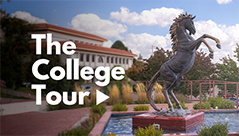The American Library Association’s annual Banned Books Week was observed this year with an event at WNMU J. Cloyd Miller Library. Sponsored by the library and the Humanities Department, the event drew a record crowd this year, with an estimate of ninety in attendance.
Director of the Library Samantha Johnson opened the event by welcoming the audience and engaging them with questions about book banning and book challenges. WNMU Writer in Residence JJ Amaworo Wilson then spoke on the history of book bans. Mentioning both ancient and more recent history, Wilson said that “Tyrants, dictators, autocrats—they are still trying to silence writers . . . When we read, we become aware of alternative ways of thinking, alternative ways of living, alternative ways of being. When we read, we learn to understand that the world could be different.” This is precisely what those in unearned positions of power fear, said Wilson. “Tyrants, dictators and autocrats,” he said, “have to maintain the lies that keep them in power.” He also offered hope to those committed to free expression. Writers usually find a way to resist—”to get their message out into the world,” he said.
Many of the presenters at the event were part of Assistant Professor Heather Frankland’s Rhetoric and Composition Workshop class. Frankland, who helped to organize the event and, along with Librarian Mindy Del Campo, emceed it said her students “have been looking at different book selections, researching why they are banned, and thinking about what it means” that the books are banned. The project culminated in a blogging contest about banned books, sponsored by the New Mexico Humanities Council, and the Banned Books event itself.
The students in the class read passages from the books they selected, engaged the audience with some questions about the books, and offered their own thoughts on whether book banning is appropriate.
Clayton Zentner, a part of the group that presented on “The Hunger Games” by Suzanne Collins, was not in favor of book bans. “The freedom you get from reading and writing . . . is very impactful. It is just not right” to ban books, he said.
Student Anthony Romero, who presented on Luis Alberto Urrea’s nonfiction work “The Devil’s Highway,” a book that details the brutal toll the border crossing takes on a group of immigrants, agreed. “This book was banned because of the explicit and graphic description of how the immigrants died,” Romero said. But this reality, he added, is exactly why the book should be read. “It brings [a perspective] of what is happening on our borders.”
After the students in Frankland’s class presented, students in Pete Rankin’s history class at Aldo Leopold Charter School read selections from “The 1619 Project” by Nikole Hannah-Jones, which has been widely challenged and banned in recent years.
The WNMU student organization MEChA also participated in the event. MEChA President Anais Orantez spoke of the organization’s role in defending the rights of Hispanic students to a culturally appropriate education, and first-year student Antonio Guerrero read a bilingual poem.
The next presenters were Leonore Hildebrandt, who could not attend the event but provided a pre-recorded poem titled “Banned Books,” and El Paso artist Linda Anderson, who gave a presentation on self-published books. Said Anderson, “One way you, as artists or writers, can bypass the book-banning efforts is to go underground, create secret publishing communities and bypass the big publishing houses.”
Local poet and WNMU graduate student Allison Waterman, who is the Grant County Poet Laureate and lead tutor of the WNMU Writing Center, concluded the event with a poem titled “Books Unite Us,” which explored the power of the written word to transport readers. The poem also exposed the futility of book bans. In Waterman’s poem, the speaker responds to those who would ban books with a retort that echoed the ethos of the Banned Books event:
“You can try to ban books and hide them from all the clinking clanging minds that want them.
But you’ll never succeed.
You’ll never get them all.
And I’ll just keep writing.
My fingers can pen faster than yours can light matches.”


